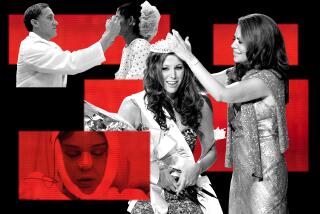The Beauty Bind : How Do You Feel About the Way You Look? The Experts Study the Question
- Share via
BEAUTY ISN’T just skin-deep or in the eye of the beholder anymore. The focus of a multibillion-dollar international business, physical appearance also has become the subject of serious study. In an era when looks are an obsession, researchers have begun to ask why.
Although psychologists and sociologists have studied appearance and its effect on society for more than 20 years, only recently has their research received attention. Last year, the University of Pennsylvania School of Medicine established the Center for Human Appearance--an institute composed of cosmetic surgeons, aesthetic dentists, dermatologists, psychiatrists and ophthalmologists--which analyzes appearance from physical and psychological points of view.
In 1984 at Marquette University in Wisconsin, social psychologist Stephen Franzoi developed the Body Esteem Scale, a questionnaire that evaluates people’s emotional responses to their bodies in objective, numerical terms. According to the scale, men tend to view their bodies in terms of physical strength, agility and how they move through space; women tend to view their bodies in terms of individual parts, weight and how they look as a static object. Five years later, the scale is widely used in diverse areas of research, including eating disorders, catastrophic injury and weight loss.
Franzoi says that people’s fixation on relationships and success, coupled with the fitness movement of the 1980s, brought appearance under scrutiny. “Suddenly, social psychologists wanted to explore how appearance fits into the equation,” he says. Among the findings, for instance, is that physically attractive people are judged to be more outgoing and are more likely to be hired than those perceived to be unattractive.
Dr. Michael Pertschuk, a psychiatrist and a founder of the Center for Human Appearance, says that changes in the medical profession also have accelerated research. “Medicine is becoming much more involved in appearance. Dermatology has gone from a specialty of illnesses of the skin to a study of skin and its appearance. The spread of cosmetic surgery has turned it into a mainstream field.”
Allana Elovson, a professor at the California School of Professional Psychology in Los Angeles, investigates the psychological problems of women who find themselves hampered in their business and social life by being too beautiful. Elovson says that she and other mental-health specialists agree that “concern with appearance is bordering on the pathological in America.” Many psychologists and psychiatrists have been forced to examine the emotional ramifications of appearance to help their patients understand and overcome their obsession with their physical images.
In Beverly Hills, for instance, psychotherapist Shelley Singer began probing the link between self-esteem and the need for cosmetic surgery “because women were coming to me to discuss whether or not surgery was going to solve all their problems.” In Scarsdale, N.Y., psychologist Rita Freedman encountered so many patients who were depressed because of their appearance that she wrote “Beauty Bound” in 1986 and now “Bodylove.” Both books deal with women’s image-related problems.
Pertschuk says that, despite increased interest, appearance studies have not been a high priority for medically-oriented federal grant dollars. But privately funded research continues, ultimately helping us understand how and why appearance affects our daily lives.
Mannequin courtesy of Vogue International






